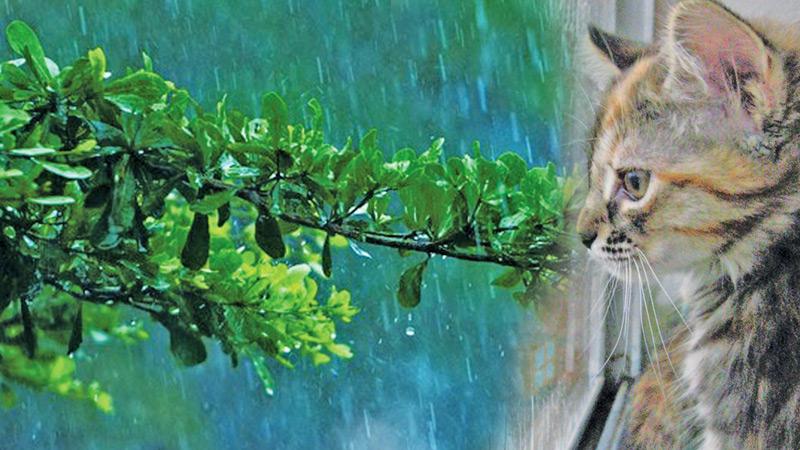
On an evening when the sky turns ominously dark and decides your garden needs a shower if you stand close to a window and look out into the world you will hear the voice of the wind singing of the lands he has seen, people he had met…
 Move closer and he will tell you about similar bouts of rain that fell long ago in April when a group of pilgrims made their way to Canterbury. He will quote Chaucer's words and remind you that such showers are inspiring and life-giving.
Move closer and he will tell you about similar bouts of rain that fell long ago in April when a group of pilgrims made their way to Canterbury. He will quote Chaucer's words and remind you that such showers are inspiring and life-giving.
“But those were spring showers,” I remind the wind; “If I remember right, Chaucer's first lines are, Whan that Aprill with his shoures soote,
The droghte of March hath perced to the roote . . .”
Wind sighs
The wind sighs and begins again. “Would it make you happy if I tell you I have seen the mist and the gloom that surrounds Jamaica Inn on nights like these and kept company with Mary Yellan when she walked miles in the dark across the sodden Cornish moors?” Seeing how I shiver, recalling the grim nights Du Maurier describes so vividly, the wind guffaws making the orange petals of the flowers under the mango tree shudder and depart to the rain sodden grass below.
'I have also been to Wuthering Heights' the wind whispers sending shivers up my spine. “I was there that night when Heathcliff disappears into a raging storm after he hears Cathy say it would degrade her to marry him. And I stayed with Cathy when she walked out to the road in search of him. That was an awful night with growling thunder and great drops splashing round her.
She remained calling, at intervals and then listening, and then crying outright.” As if on cue, the moment the wind stops singing, a branch of the jak fruit tree begins to tap on the window. I remain still not daring to open the window to reach for the branch. It is not easy to forget how Lockwood tries to stop the branches banging against his window on his second visit to Wuthering Heights and comes across a little ice cold hand. Thankfully, the tapping on my window does not last long, and soon my cat jumps onto the windowsill and decides to watch the rain with me. The warmth from his soft fur leaning against my arm is soothing against the dark revelations the wind is unfolding before me.
Gliding smoothly
But unexpectedly, he changes his tune. Now gliding smoothly across the branches of the Sepalika bush he talks of the days when he and the rain collaborated to make two hearts find one another. He recalls the day Mrs Bennett sends Jane to Netherfield Park on horse rather than in a carriage. “We might have over done it a bit,” confesses the wind, “because when we soaked her to the bone we didn't think she will catch a cold and fall sick. But it worked in the end. She remained at Netherfield long enough to make Cupid work his magic.”
“I have also been in Casterbirdge,” boasts the wind. “The rain and I made sure Elizabeth and Donald Farfrae should take shelter in a granary and watch individual drops of rain creeping down the thatch of the opposite rick—straw after straw—till they reached the bottom. When he saw the wheat husks on Elisabeth's dress I heard Donald say, “it's very bad to let rain come upon clothes when there's chaff on them. It washes in and spoils them. Let me help you—blowing is the best." And he began blowing her back hair, and her side hair, and her neck, and the crown of her bonnet, and the fur of her victorine, Elizabeth saying, "O, thank you," at every puff.”
But nothing came of that encounter, I remind the wind. After all, Donald marries someone else. “That's not my fault,” the wind huffs scattering a handful of Sepalika flowers onto the Croton bushes below. The wind raises his voice. “It was Thomas Hardy's wish to make things as hard as possible for the Mayor of Casterbridge and his family. Things were a bit better with farmer Gabriel Oak though,” the wind reproaches me for forgetting. “Gabriel manages to save Bathsheba's wheat and barley doesn't he, before the rain and I could destroy them.”
Standstill
The world comes to a standstill when the wind pauses to think. The mango branches swaying to the rhythm of the wind's song turns to stone. “We have done some good things too, the rain and I,” he speaks again. The leaves awaken from their stupor on hearing his voice. As they rustle and urge the wind to sing again he reminds me of the long forgotten poem; “I have been one acquainted with the night. I have walked out in rain—and back in rain.” Of course. I agree, and recall the other, more famous lines of Robert Frost, when he wrote about the darkest evening of the year. The wind recites the lines for me, “The woods are lovely, dark and deep, But I have promises to keep, And miles to go before I sleep.”
As if he too has taken the poet's words to heart the song of the wind fades away, the raindrops slacken their speed and gradually disappear leaving only a few of their kindred behind; working steadily they create beautiful paintings on the glass panes. The sky calms down and the moon looks out on a rejuvenated world.
And I retire to my desk remembering I too have promises to keep.
